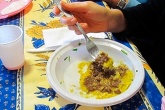Government considering action on wet wipes containing plastic

Following on from proposed bans on plastic straws, drink stirrers and cotton buds, the government has revealed that wet wipes could be the next single-use product in the firing line.
A spokesperson from the Department of Environment, Food and Rural Affairs (Defra) yesterday (7 May) stated: “As part of our 25 Year Environment Plan, we have pledged to eliminate all avoidable plastic waste, and that includes single-use products like wet wipes.
“We are continuing to work with manufacturers and retailers of wet wipes to make sure labelling on packaging is clear and people know how to dispose of them properly – and we support the industry’s efforts to make their customers aware of this important issue.”
The convenience of wet wipes for a wide range of purposes, including makeup removal, household cleaning and personal hygiene, makes for an ever-growing market. Made from a mix of synthetic cellulose and plastic fibres and saturated with a solution of chemical ingredients including softeners, perfumes, preservatives and antibacterials, the wipes do not biodegrade so cannot be flushed or composted.
Despite it being unclear whether the government is to pursue a ban on the single-use items, or facilitate voluntary action from businesses – an approach it has taken towards combating food waste – wet wipes are certainly a product that needs attention.
Wet wipes get flushed in vast quantities in the UK, with Water UK, the trade body representing water and sewerage companies across the country, reporting that the items make up about 93 per cent of the material causing huge sewer blockages or ‘fatbergs’. And wipes continue to find their way into our marine environment, where they can be mistaken for food by wildlife like turtles and seabirds. Data from the 2017 Great British Beach Clean, organised by the Marine Conservation Society (MCS), reveals a 94 per cent rise from the previous year in the number of disposable wet wipes found on beaches, with an average of 27.4 wipes found per every 100 metres of beachfront searched by volunteers.
Providing better information for consumers about how best to dispose of wet wipes is one step towards reducing pollution, but encouraging the use of reusable alternatives, such as cloth wipes which go in the washing machine, could also help to tackle the issue. The convenience provided by the disposal items, however, is something many users would be loathe to give up – a similar story to the problem of disposable nappies, which also contain plastic fibres.
The Defra spokesperson added that the government wants to encourage innovation at the design stage, to improve the recyclability of wet wipes, stating that it is “working with industry to support the development of alternatives, such as a wet-wipe product that does not contain plastic and can therefore be flushed".

This potential action on wet wipes is the latest in a long line of proposed measures to tackle plastic pollution, and follows the announcement by Prime Minister Theresa May in April that the government is to consult on a ban on plastic straws, drink stirrers and cotton buds.
It is as yet unclear when these bans might eventually come into force, with a consultation already ongoing from the Treasury looking at how the tax system might be used to address single-use plastic waste. Environment Secretary Michael Gove has also promised a consultation on the potential for a deposit return scheme (DRS) for drinks containers in England, but told MPs in April that this would have to wait until the conclusion of the Treasury’s plastic tax consultation, suggesting that a DRS could feasibly be introduced by 2020.
It is worth bearing in mind that the government’s ability to impose a ban may hinge on the UK’s future relationship with the EU, as the rules of the Single Market are underpinned by four fundamental freedoms of the internal market, the free movement of goods being the first. It is unclear how a national ban on wet wipes would work were the UK to strike a Brexit deal that saw the country remain within the Single Market, Customs Union or a facsimile of the two.
There is precedent for challenges from industry to similar bans, such as that threatened by Pack2Go, an organisation representing European packaging manufacturers, against the French Government after it passed a law in 2016 banning disposable plastic plates, cutlery and cups by 2020. Any type of blanket ban could potentially prove a sticking point in negotiations over prospective free trade deals with other countries outside of the EU.







